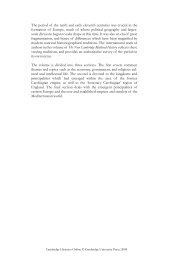- Page 2 and 3:
THE GREEK WARS
- Page 4 and 5:
The Greek Wars The Failure of Persi
- Page 6 and 7:
PREFACE THE viewpoint of this book
- Page 8 and 9:
CONTENTS Abbreviations viii 1. Intr
- Page 10 and 11:
1 Introduction To the Great King, s
- Page 12 and 13:
Introduction 3 position of the Pers
- Page 14 and 15:
Introduction 5 Babylon, especially
- Page 16 and 17:
Introduction 7 thinking the Athenia
- Page 18 and 19:
Introduction 9 Xerxes called on the
- Page 20 and 21:
Introduction 11 ings with the King.
- Page 22 and 23:
Introduction 13 the oncoming army a
- Page 24 and 25:
Introduction 15 of the Empire did n
- Page 26 and 27:
Introduction 17 Herodotus and Gtesi
- Page 28 and 29:
Introduction 19 690). 56 Both were
- Page 30 and 31:
Introduction 21 writers would have
- Page 32 and 33:
Introduction 23 10. Behistun Inscri
- Page 34 and 35:
Introduction 25 The Royal women wer
- Page 36 and 37:
Introduction 27 different from Xeno
- Page 38 and 39:
Introduction 29 generally accepted
- Page 40 and 41:
The Subjection of the Greeks of Asi
- Page 42 and 43:
The Subjection of the Greeks of Asi
- Page 44 and 45:
The Subjection of the Greeks of Asi
- Page 46 and 47:
The Subjection of the Greeks of Asi
- Page 48 and 49:
The Subjection of the Greeks of Asi
- Page 50 and 51:
The Subjection of the Greeks of Asi
- Page 52 and 53:
The Subjection of the Greeks of Asi
- Page 54 and 55:
The Subjection of the Greeks of Asi
- Page 56 and 57:
'The lands beyond the sea' 47 the b
- Page 58 and 59:
'The lands beyond the sea' 49 metre
- Page 60 and 61:
'The lands beyond the sea' 51 year
- Page 62 and 63:
'The lands beyond the sea' 53 Potid
- Page 64 and 65:
'The lands beyond the sea' 55 On th
- Page 66 and 67:
'The lands beyond the sea' 57 The s
- Page 68 and 69:
'The lands beyond the sea' 59 as fa
- Page 70 and 71:
4 The Ionian Revolt 'I AM Darius th
- Page 72 and 73:
The Ionian Revolt 63 it, he asserte
- Page 74 and 75:
The Ionian Revolt 65 As it was the
- Page 76 and 77:
The Ionian Revolt 67 Herodotus' int
- Page 78 and 79:
The Ionian Revolt 69 us of Histiaeu
- Page 80 and 81:
The Ionian Revolt 71 one gives of H
- Page 82 and 83:
The Ionian Revolt 73 rather than of
- Page 84 and 85:
The Ionian Revolt 75 shortly to ret
- Page 86 and 87:
The Ionian Revolt 77 anabasis, and
- Page 88 and 89:
The Ionian Revolt 79 and arranging
- Page 90 and 91:
The Ionian Revolt 81 4. For the var
- Page 92 and 93:
The Ionian Revolt 83 of Ibanollis o
- Page 94 and 95:
The Ionian Revolt 85 sailors of Ion
- Page 96 and 97:
5 The Conquest of Greece THERE is n
- Page 98 and 99:
The Conquest of Greece 89 and Persi
- Page 100 and 101:
The Conquest of Greece 91 skill was
- Page 102 and 103:
The Conquest of Greece 93 Even geog
- Page 104 and 105:
The Conquest of Greece 95 the motiv
- Page 106 and 107:
The Conquest of Greece 97 began its
- Page 108 and 109:
The Conquest of Greece 99 the other
- Page 110 and 111:
The Conquest of Greece 101 played o
- Page 112 and 113:
The Conquest of Greece 103 Xerxes t
- Page 114 and 115:
The Conquest of Greece 105 He was w
- Page 116 and 117:
The Conquest of Greece 107 use of t
- Page 118 and 119:
The Conquest of Greece 109 to influ
- Page 120 and 121:
The Conquest of Greece 111 tans, or
- Page 122 and 123:
The Conquest of Greece 113 were scr
- Page 124 and 125:
The Conquest of Greece 115 reason w
- Page 126 and 127:
The Conquest of Greece 117 7. Cf. M
- Page 128 and 129:
The Conquest of Greece 119 of by th
- Page 130 and 131:
The Conquest of Greece 121 explaini
- Page 132 and 133:
The Conquest of Greece 123 made to
- Page 134 and 135:
The Conquest of Greece 125 Mardoniu
- Page 136 and 137:
The War in the East Aegean 127 cont
- Page 138 and 139:
The War in the East Aegean 12 9 pri
- Page 140 and 141:
The War in the East Aegean 131 acco
- Page 142 and 143:
The War in the East Aegean 133 Gree
- Page 144 and 145:
The War in the East Aegean 135 rein
- Page 146 and 147:
The War in the East Aegean 137 land
- Page 148 and 149:
7 Peace with Athens, 449—412 BC F
- Page 150 and 151:
Peace with Athens, 449-412 BC 141 w
- Page 152 and 153:
Peace with Athens, 449-412 BC 143 f
- Page 154 and 155:
Peace with Athens, 449-412 BC 145 5
- Page 156 and 157:
8 The Recovery of the Greeks of Asi
- Page 158 and 159:
The Recovery of the Greeks of Asia
- Page 160 and 161:
The Recovery of the Greeks of Asia
- Page 162 and 163:
The Recovery of the Greeks of Asia
- Page 164 and 165: The Recovery of the Greeks of Asia
- Page 166 and 167: The Recovery of the Greeks of Asia
- Page 168 and 169: The Recovery of the Greeks of Asia
- Page 170 and 171: The Recovery of the Greeks of Asia
- Page 172 and 173: The Recovery of the Greeks of Asia
- Page 174 and 175: The Recovery of the Greeks of Asia
- Page 176 and 177: The Recovery of the Greeks of Asia
- Page 178 and 179: The Recovery of the Greeks of Asia
- Page 180 and 181: The Recovery of the Greeks of Asia
- Page 182 and 183: The Recovery of the Greeks of Asia
- Page 184 and 185: 9 From the King's Peace to the End
- Page 186 and 187: From the King's Peace to the Social
- Page 188 and 189: From the King's Peace to the Social
- Page 190 and 191: From the King's Peace to the Social
- Page 192 and 193: From the King's Peace to the Social
- Page 194 and 195: From the King's Peace to the Social
- Page 196 and 197: From the King's Peace to the Social
- Page 198 and 199: From the King's Peace to the Social
- Page 200 and 201: From the King's Peace to the Social
- Page 202 and 203: From the King's Peace to the Social
- Page 204 and 205: From the King's Peace to the Social
- Page 206 and 207: From the King's Peace to the Social
- Page 208 and 209: The End of the Achaemenids 19 9 den
- Page 210 and 211: The End of the Achaemenids 2 o i Is
- Page 212 and 213: The End of the Achaemenids 2 03 den
- Page 216 and 217: The End of the Achaemenids 207 Memn
- Page 218 and 219: The End of the Achaemenids 209 16.
- Page 220 and 221: The End of the Achaemenids 211 itel
- Page 222 and 223: The End of the Achaemenids 213 grea
- Page 224 and 225: The End of the Achaemenids 215 must
- Page 226 and 227: The End of the Achaemenids 217 (Dio
- Page 228 and 229: The End of the Achaemenids 219 like
- Page 230 and 231: Appendix 1 Persian and Greek Naval
- Page 232 and 233: Persian and Greek Naval Warfare: Th
- Page 234 and 235: Persian and Greek Naval Warfare: Th
- Page 236 and 237: Persian and Greek Naval Warfare: Th
- Page 238 and 239: Persian and Greek Naval Warfare: Th
- Page 240 and 241: Persian and Greek Naval Warfare: Th
- Page 242 and 243: Appendix 2 Histiaeus THERE are endl
- Page 244 and 245: Histiaeus 235 been persuaded of the
- Page 246 and 247: Appendix 3 Persian Armies THE succe
- Page 248 and 249: Persian Armies 239 Arrian (Anab. 3.
- Page 250 and 251: Persian Armies 241 it be very stran
- Page 252 and 253: Persian Armies 243 appointment, one
- Page 254 and 255: Persian Armies 245 they were probab
- Page 256 and 257: Persian Armies 247 and 8. 13. i). T
- Page 258 and 259: Persian Armies 249 Yet when the inv
- Page 260 and 261: Persian Armies 2 51 Armies of the m
- Page 262 and 263: Persian Armies 253 the Chiliarch, J
- Page 264 and 265:
Appendix 4 The Persian Navy 'ALL th
- Page 266 and 267:
The Persian Navy 257 ing already sa
- Page 268 and 269:
The Persian Navy 259 Ikes they coul
- Page 270 and 271:
The Persian Navy 2 61 i) put the st
- Page 272 and 273:
The Persian Navy 263 presumably tro
- Page 274 and 275:
The Persian Navy 265 attempting whe
- Page 276 and 277:
The Persian Navy 267 Phoenician shi
- Page 278 and 279:
7. 8. The Persian Navy 269 of Agesi
- Page 280 and 281:
The Persian Navy 271 between them a
- Page 282 and 283:
The Persian Navy 273 Army list. The
- Page 284 and 285:
Thermopylae and 'the way into' Gree
- Page 286 and 287:
Appendix 6 The Themistocles Decree
- Page 288 and 289:
The Themistocles Decree 279 a large
- Page 290 and 291:
Appendix 7 The Peace of Gallias THE
- Page 292 and 293:
The Peace qfCallias 283 such places
- Page 294 and 295:
The Peace qfCallias 285 i. 16), and
- Page 296 and 297:
The Peace qfCallias 287 dm. 13.4) t
- Page 298 and 299:
The Peace qfCallias 289 have so spo
- Page 300 and 301:
The Alleged Treaty qfBoiotios 291 A
- Page 302 and 303:
366 BC 293 naval ambitions, presuma
- Page 304 and 305:
366 BC 295 been the same, having in
- Page 306 and 307:
366 BC 297 Congress in Sparta that
- Page 308 and 309:
366BC 299 holder of subordinate off
- Page 310 and 311:
List of Works Referred to in the No
- Page 312 and 313:
List of Works Referred to in the No
- Page 314 and 315:
List of Works Referred to in the No
- Page 316 and 317:
List of Works Referred to in the No
- Page 318 and 319:
List of Works Referred to in the No
- Page 320 and 321:
Abrocomas 162 Achaemenes 243-4, 257
- Page 322 and 323:
Gaugamela, battle of 2, 199, 211-12
- Page 324 and 325:
Polycrates 34, 39, 40, 41, 52 Prien








